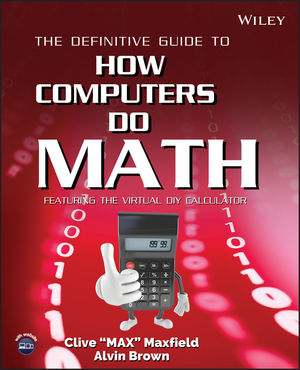The Definitive Guide to How Computers Do Math: Featuring the Virtual DIY CalculatorISBN: 978-0-471-73278-5
Paperback
464 pages
September 2005
 This is a Print-on-Demand title. It will be printed specifically to fill your order. Please allow an additional 10-15 days delivery time. The book is not returnable.
|
||||||
Laboratories ix
Do You Speak Martian? xi
Chapter 0 Why This Book is So Cool 1
This is where we discover just why this book is so cool, and also why this chapter is numbered “0.”
Chapter 1 Introducing Binary and Hexadecimal Numbers 7
In this chapter we introduce the concepts of the binary and hexadecimal number systems (but in a much more interesting manner than most computer books).
Chapter 2 Computers and Calculators 23
Here we rampage through the insides of a simple computer and calculator, and we also meet our virtual DIY Calculator.
Chapter 3 Subroutines and Other Stuff 35
In this smorgasbord of a chapter, we first discuss logical, shift, and rotate instructions; then we plunge headfirst into the stack, subroutines, recursion, and the concept of selfmodifying code.
Chapter 4 Integer Arithmetic 69
This is where we learn the concepts of signed and unsigned binary arithmetic, and multibyte data representations. In the labs associated with this chapter we create some integer-based math subroutines for use in Chapter 5.
Chapter 5 Creating an Integer Calculator 123
This is where things really start to get interesting because we use the subroutines we developed in Chapter 4 to implement a simple four-function integer calculator.
Chapter 6 More Functions and Experiments 135
This may be the last chapter, but turn that frown upside down into a smile because this is where we discover additional projects you can undertake, and also how you can compete with other readers to create better math routines for your DIY Calculator.
Interactive Laboratories 155–412
This is where you will find the interactive laboratories associated with Chapters 2 through 5 (see more details on page ix).
Appendix A Installing Your DIY Calculator 413
In this appendix, we learn how to install the virtual DIY Calculator presented on the CD-ROM accompanying this book.
Appendix B Addressing Modes 417
Here we learn about the various addressing modes supported by the virtual microprocessor powering the DIY Calculator.
Appendix C Instruction Set Summary 429
The tables in this appendix are useful for quickly determining which instructions are available with which addressing modes.
Appendix D Additional Resources 433
There is a wealth of additional resources for individual readers and educators on the CD-ROM accompanying the book and from the DIY Calculator’s website. Also, there are lots of other really interesting books to read. This appendix explains it all.
About the Authors 441
Acknowledgments 443
Index 445



